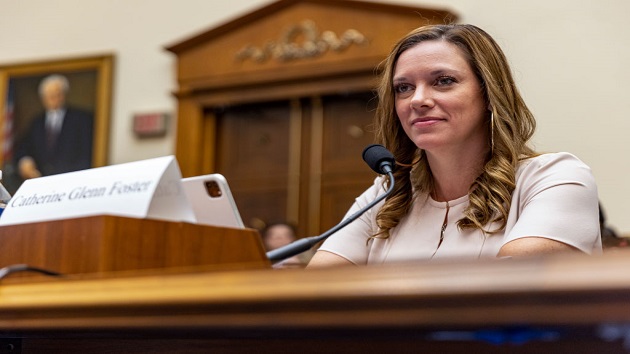
(WASHINGTON) — In a House hearing on Capitol Hill this week, an anti-abortion rights advocate said ending a pregnancy isn’t an abortion when it involves a 10-year-old rape victim.
The comment stunned the Democratic lawmaker questioning her.
The American College of Obstetricians and Gynecologists defines abortion as a “medical intervention provided to individuals who need to end the medical condition of pregnancy.”
“Wait, it would not be an abortion?” said Rep. Eric Swalwell, D-Calif.
Catherine Glenn Foster, head of the anti-abortion group Americans United for Life, told Swalwell she didn’t think it was.
“If a 10-year-old with her parents made the decision not to have a baby that was a result of a rape, if a 10-year-old became pregnant as a result of rape, and it was threatening her life then that’s not an abortion,” Foster told the House Judiciary Committee on Thursday.
Around the same time as Foster’s testimony, the top lawyer for the National Right to Life Committee, had a decidedly different take.
In a phone interview with Politico, James Bopp said the girl should have been forced to carry the pregnancy to term under model legislation he wrote last June as NRLC’s general counsel. That legislation is being used by states to adopt abortion restrictions.
“She would have had the baby, and as many women who have had babies as a result of rape, we would hope that she would understand the reason and ultimately the benefit of having the child,” Bopp is quoted as saying.
Bopp did not respond to requests for an interview.
After spending decades united in a quest to overturn Roe v. Wade, the conservative movement is facing tough questions about what it means to oppose abortion.
Should there be exemptions for rape and incest? Does the age of the victim matter? What does it mean to protect the “life of the mother”? How imminent should death be before a doctor can legally intervene?
Other questions: Should states enact laws preventing women from traveling out of state for abortions? Should they ban IUDs and the emergency contraceptives like Plan B?
Conservatives praising the Supreme Court ruling say those details should be decided by voters in states. Abortion rights proponents say rights to liberty and privacy should not be up to voters to decide, but are guaranteed in the Constitution.
“In case we’ve forgotten, this is what democracy looks like,” said Rep. Michelle Fischbach, R-Minn,, in defending the Supreme Court’s decision.
But no case has challenged the anti-abortion rights movement more than the rape of a 10-year-old Ohio girl.
Following the arrest of a 27-year-old man in her case, a detective testified in a court hearing this week that the girl became pregnant as a result of the rape and traveled to Indianapolis to undergo an abortion. Ohio has banned abortion after cardiac activity is detected, which is at about six weeks into pregnancy. The state does not provide exceptions in cases of rape or incest.
Indiana’s Republican attorney general said he planned to investigate the doctor who helped the girl get an abortion. An attorney representing Dr. Caitlin Bernard said she followed reporting procedures, and Indiana University Health said an investigation found that she was in compliance with privacy laws.
Several Republican politicians, including Rep. Jim Jordan, a House Judiciary Committee member, had questioned whether the case had been fabricated for political reasons. Jordan did not reference the case in his questioning at the hearing on Thursday, instead speaking about violent attacks against anti-abortion pregnancy centers.
Jennifer Holland, a history professor at the University of Oklahoma, said she thinks conservatives are struggling to talk about the rape case of such a young victim because they never had to before.
“For 50 years, the focus has been as much as possible on the fetus,” she said. “They chose never to reckon with hard cases. Now that they have the power of the state, that’s very different.”
Daniel Williams, a history professor at the University of West Georgia who studies politics and religion, said support among conservatives for exceptions to rape and incest have changed over time. In this case, leaders in the anti-abortion rights movement probably weren’t prepared for such a case to confront them so soon after the reversal of Roe vs. Wade, he said.
“I doubt, though, that this will be a substantial setback for the movement,” said Williams. “At most, it may make some conservative states that are considering an abortion ban to think about including a rape (or) incest exception clause, but even that is uncertain. But we’re in uncharted territory here, so predictions about future developments are difficult to make.”
Sarah Warbelow, the legal director of the Human Rights Campaign, said it’s disinformation to suggest an abortion wouldn’t be an abortion for a 10-year-old rape victim.
“Abortion is a medical procedure. It’s a medical procedure that individuals undergo for a wide range of circumstances, including because they have been sexually assaulted, raped in the case of the 10-year-old,” she said.
Dr. Rachel Boren, a member of the ABC News Medical Unit, contributed to this report.
Copyright © 2022, ABC Audio. All rights reserved.
